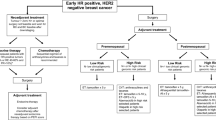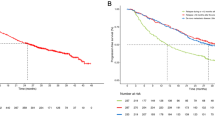Abstract
Background
Recently, a high rate of brain metastases has been reported among patients with human epidermal growth factor receptor (HER2)-overexpressing metastatic breast cancer who were treated with trastuzumab. The present study examined risk factors for the development of brain metastasis in patients with HER2-overexpressing breast cancer who were treated with trastuzumab.
Methods
We retrospectively reviewed 204 patients with HER-2-overexpressing breast cancer who were treated with a trastuzumab-containing regimen between 1999 and 2006. Patients with clinical symptoms were diagnosed as having brain metastases when brain magnetic resonance imaging (MRI) or a computed tomography (CT) scan revealed positive findings for brain metastases. The median follow-up time of this cohort was 53.6 months.
Results
Among the patients who received a trastuzumabcontaining regimen, 74 patients (36.3%) developed brain metastases. The median survival from the diagnosis of brain metastases was 13.5 months (95% confidence interval [CI], 12.2–14.7 months). The median time interval between the beginning of trastuzumab treatment and the diagnosis of brain metastases was 13.6 months (range, 0.0–45.8 months). Among patients with brain metastases, the median overall survival period was 39 months. A multivariate logistic regression analysis showed that age (≤50 years), recurrent breast cancer, and liver metastases were significant risk factors for the development of brain metastases.
Conclusion
Patients with HER2-overexpressing breast cancer treated with trastuzumab had a high incidence of brain metastases (36.3%). Routine screening for brain metastases 1 year after the start of trastuzumab treatment, may be warranted in younger patients (≤50 years) who had recurrent breast cancer with liver metastases.
Similar content being viewed by others
References
Slamon DJ, Clark GM, Wong SG, et al. (1987) Human breast cancer: correlation of relapse and survival with amplification of the HER-2/neu oncogene. Science 235:177–182
Slamon DJ, Gololphin W, Jones LA, et al. (1989) Studies of the HER-2/neu proto-oncogene in human breast and ovarian cancer. Science 244:707–712
Press MF, Bernstein L, Thomas PA, et al. (1997) HER-2/neu gene amplification characterized by fluorescence in situ hybridization: poor prognosis in node-negative breast carcinomas. J Clin Oncol 15:2894–2904
Carter P, Presta L, Gorman CM, et al. (1992) Humanization of an anti-p185HER2 antibody for human cancer therapy. Proc Natl Acad Sci USA 89:4285–4289
Slamon DJ, Leyland-Jones B, Shak S, et al. (2001) Use of chemotherapy plus a monoclonal antibody against HER2 for metastatic breast cancer that overexpresses HER2. N Engl J Med 344:783–792
Smith I, Procter M, Gelber RD, et al. (2007) Two-year follow-up of trastuzumab after adjuvant chemotherapy in HER2-positive breast cancer: a randomized controlled trial. Lancet 369:29–36
Romand EH, Perez EA, Bryant J, et al. (2005) Trastuzumab plus adjuvant chemotherapy for operable HER2-positive breast cancer. N Engl J Med 353:1673–1684
Joensuu H, Kellokumpu-Lehtinen PL, Bono P, et al. (2006) Adjuvant docetaxel or vinorelbine with or without trastuzumab for breast cancer. N Engl J Med 354:809–820
Miller KD, Weathers T, Haney LG, et al. (2003) Occult central nervous system involvement in patients with metastatic breast cancer: prevalence, predictive factors and impact on overall survival. Ann Oncol 14:1072–1077
Clayton AJ, Danson S, Jolly S, et al. (2004) Incidence of cerebral metastases in patients treated with trastuzumab for metastatic breast cancer. Br J Cancer 91:639–643
Bendell JC, Domchek SM, Burstein HJ, et al. (2003) Central nervous system metastases in women who receive transtuzumab-based therapy for metastatic breast carcinoma. Cancer 97:2972–2977
Yau T, Swanton C, Chua S, et al. (2006) Incidence, pattern and timing of brain metastases among patients with advanced breast cancer treated with trastuzumab. Acta Oncol 45:196–201
Lai R, Dang CT, Malkin MG, et al. (2004) The risk of central nervous system metastases after trastuzumab therapy in patients with breast carcinoma. Cancer 101:810–816
Shmueli E, Wigler N, Inbar M (2004) Central nervous system progression among patients with metastatic breast cancer responding to trastuzumab treatment. Eur J Cancer 40:379–382
Gabos Z, Sinha R, Hanson J, et al. (2006) Prognostic significance of human epidermal growth factor receptor positivity for the development of brain metastasis after newly diagnosed breast cancer. J Clin Oncol 24:5658–5663
Slimane K, Andre F, Delaloge S, et al. (2004) Risk factors for brain relapse in patients with metastatic breast cancer. Ann Oncol 15:1640–1644
Stemmler HJ, Kahlert S, Siekiera W, et al. (2006) Characteristics of patients with brain metastases receiving trastuzumab for HER2 overexpressing metastatic breast cancer. Breast 15:219–225
Pestalozzi BC, Zahrieh D, Price KN, et al. (2006) Identifying breast cancer patients at risk for central nervous system (CNS) metastases in trials of the International Breast Cancer Study Group (IBCSG). Ann Oncol 17:935–944
Pestalozzi BC, Brignoli S (2000) Trastuzumab in CSF. J Clin Oncol 2000;18:2350–2351
Lin NU, Carey LA, Liu MC, et al. (2006) Phase II trial of lapatinib for brain metastases in patients with HER2+ breast cancer. J Clin Oncol 24(18 Suppl):503
Author information
Authors and Affiliations
Corresponding author
About this article
Cite this article
Ono, M., Ando, M., Yunokawa, M. et al. Brain metastases in patients who receive trastuzumab-containing chemotherapy for HER2-overexpressing metastatic breast cancer. Int J Clin Oncol 14, 48–52 (2009). https://doi.org/10.1007/s10147-008-0797-8
Received:
Accepted:
Published:
Issue Date:
DOI: https://doi.org/10.1007/s10147-008-0797-8




